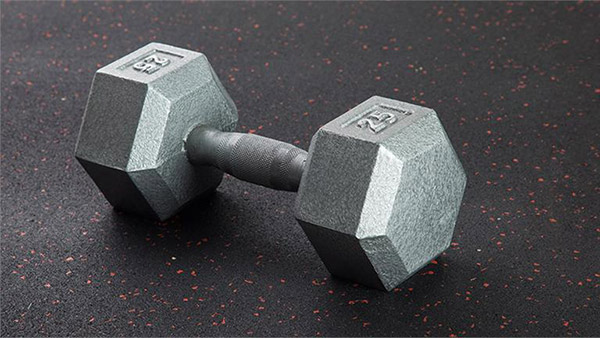
Selecting the Right Rubber Flooring on GSA Contract
Rubber flooring purchasing guide for Government buyers
This is where "the rubber meets the floor." While choosing the correct rubber gym flooring for a fitness room seems simple, it's a purchase that you want to get right the first time. Unfortunately, most government purchase personnel don't have the time and/or expertise to properly investigate this purchase. In addition, working through www.GSAadvantage.gov overwhelms most purchasing personnel.
Without adequate knowledge, most decisions will be made using the criteria of price and/or appearance. Sometimes this works, but often the end result is a marginally acceptable product that looks good but performs poorly. At IRON COMPANY, we understand that on GSA contract there is a broad selection with many options for consideration. Following is a brief overview and discussion with the pros and cons of many products.
Overview
A fitness facility needs a rubber floor for one primary reason - PROTECTION.
Workouts and physical training create a source of impact that varies greatly from the activity of human feet just walking or a repetitive workout. Impact can come from heavy workout machines, Olympic weight plates, dumbbells and kettlebells being used. The impact and vibration is absorbed and dissipated by quality rubber flooring. Rubber flooring also offers cushioning and reduces the risk of injury and fatigue. Hard surfaces, such as concrete, put unnecessary stress on the human body during high-impact exercise. Additionally, rubber flooring provides excellent traction.
Rubber flooring comes in three basic styles:
For more information on the different composition of rubber flooring, please review our "Best Rolled Rubber Flooring Thickness" article. It covers the manufacturing aspects more in-depth.
Rolled Rubber Flooring
Rolled Rubber Flooring is the number one type of gym flooring purchased on GSA contract. It comes in various thicknesses:
- 1/4" Thick Rolled Rubber - light commercial use with minimum weight dropping.
- 8MM Thick Rolled Rubber - great combination and value between 1/4" and 3/8".
- 3/8" Thick Rolled Rubber - commercial grade found in high-use facilities.
- 1/2" Thick Rolled Rubber - for extreme use and protection.
Among government buyers, the most popular rubber roll thickness is 3/8". This thickness is commercial rated and excels in heavy-use environments with high free-weight activity. It weighs 2.2 lbs. per square foot and is either installed with a double-sided rubber flooring tape or a polyurethane rubber flooring adhesive.
The vast majority of purchases for rubber flooring rolls are for the color black.
Rubber rolls also come with speckled colors that comprise 10% - 34% of content, based on needs and preferences. The most-purchased speckled colors are grey and tan, as both colors are neutral and work well in any décor or setting. Moreover, these colors don't overwhelm with too much color, and they hide dust well.
Another advantage of rolled rubber flooring is that it can be cut to length for your facility. The 4-foot wide rolls minimize seams and create a clean look.
The only con with roll rubber flooring is that the application is permanent. While it can be added to as your facility grows, removing the flooring is not an option for reuse.
Interlocking Rubber Flooring
A lot of 3/8" thick interlocking rubber flooring tiles are cut from rolled rubber, which is a surprising fact for most people, which means that it has the same physical characteristics and performance but does not require adhesive. Interlocking rubber tiles come in various sizes, from 2' squares - 4' squares. These tiles go together with tabs that snap together tightly like puzzle pieces.
One of the advantages of interlocking rubber flooring is that no adhesive is required. It's a "loose lay" product, meaning that it lays flat without adhesive and does not move. Almost anyone can install interlocking rubber flooring, or "puzzle mats" as some people call them. Additionally, many manufacturers offer corner and edge pieces that allow you to create a finished perimeter on the flooring. Another plus with interlocking rubber is that it can be easily added to and expanded if needed. If a tile should ever get damaged it is easy to pull out and replace. And if you relocate, the flooring can go with you.
Interlocking rubber comes in black and several speckled colors. Also, the thicknesses range from 1/4" - 8MM - 3/8" - 1/2" - 3/4". If you have unusual room configurations, interlocking rubber works well in this scenario.
Rubber Gym Mats
Rubber mats for gyms are known primarily for their cost effectiveness. The industry standard size for rubber mats is 4' x 6'. Thicknesses vary from 3/8" - 1/2" - 3/4", with 3/4" being the most popular size. The 3/4" mat weighs in at 4 pounds per square foot and offers superior protection which is why they are the number one choice for deadlifting . It is always recommended to have fitness mats "trued" to ensure that they will fit together tightly without gaps.
A note of caution when looking for fitness rubber mats. "horse stall mats" are often viewed as a suitable rubber flooring solution in a fitness area. Stall mats are manufactured without the same consistencies and quality control of fitness mats. This results in larger tolerances that make it difficult to match up edge-to-edge on multiple mats. In addition, the variation in thickness with stall mats creates hills and valleys that have the potential for becoming a trip hazard. It is always recommended to stay with fitness rubber mats.
Summary
This has been a quick overview and purchasing guide for rubber flooring. And there is much more information available, with specialty options to consider. So look to us at IRON COMPANY as your "GO TO" rubber flooring expert for government purchases.
We have the experience and expertise to steer you in the right direction for your application.
About the Author
John Sisk is a former US Marine and is passionate about helping others achieve success in the arena of fitness. As a fitness industry veteran of over 40-years, John has the experience, product knowledge, and perspective that are second to none. John was founder and president of Legend Fitness for 29 years before teaming up with IRON COMPANY in 2006. With over 147 manufacturing partners, John has the right tools, experience, and expertise to ensure you get the best products for your fitness application, whether it is for military, commercial, or personal use. This is more than a job; it is a lifetime commitment to helping people. When not at IRON COMPANY, John can be found leading a Bible Study in the inner city or hiking the Appalachian Trail. Contact John here.


